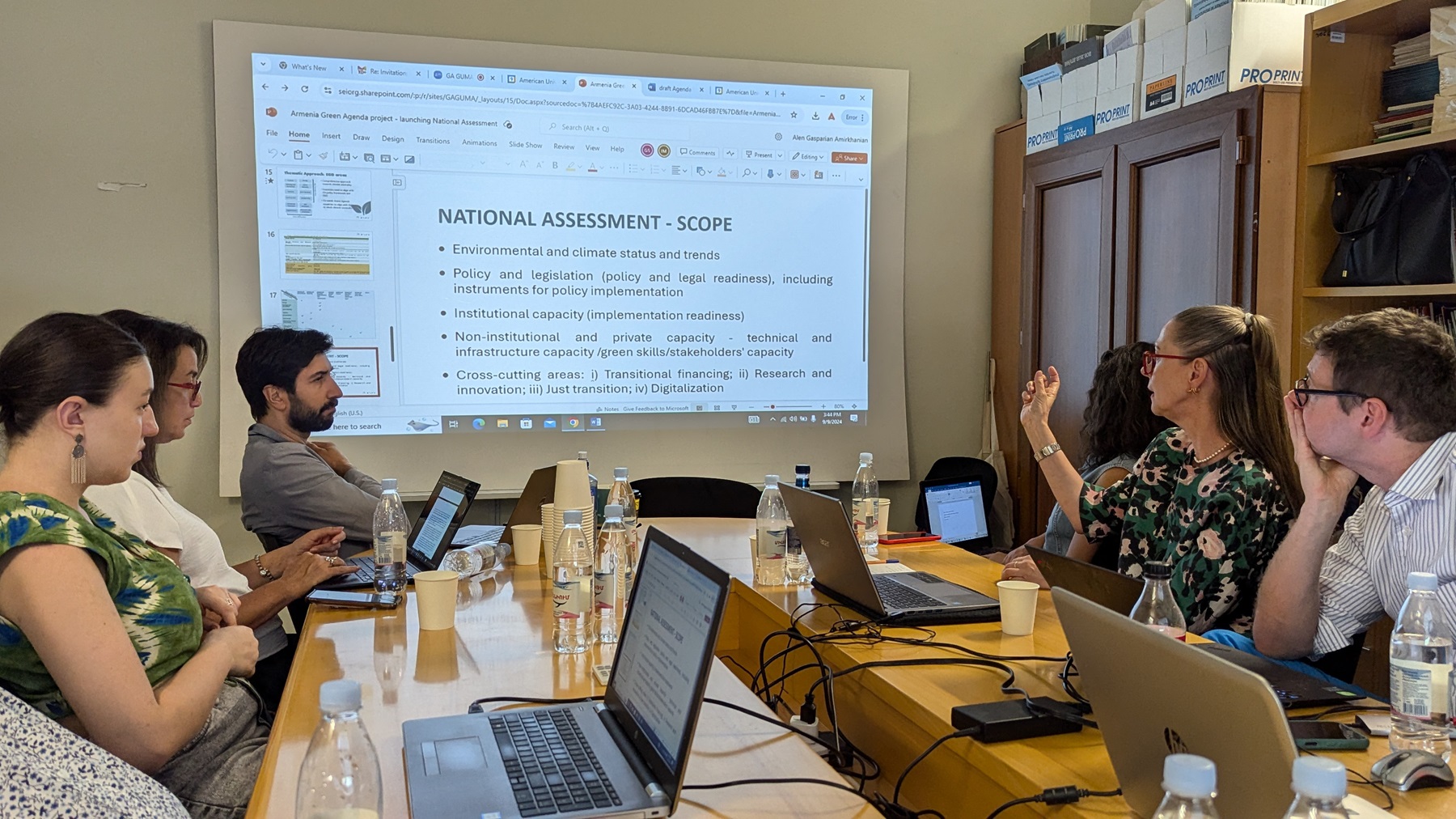Green Agenda Launches National Assessment Phase for Armenia
 The Green Agenda team launches the national assessment phase for Armenia's green transition roadmap development. Photo: Nazenik Saroyan / SEI
The Green Agenda team launches the national assessment phase for Armenia's green transition roadmap development. Photo: Nazenik Saroyan / SEI
Last week, the Green Agenda team took a significant step forward by initiating the national assessment phase of Armenia’s green transition roadmap development process. Discussions held in Yerevan brought together key international and national experts of the Green Agenda Armenia project team.
The consultations held at the American University of Armenia's (AUA) Acopian Center for the Environment focused on advancing the development of a detailed green transition plan. This plan involves several key steps. First, it looks at the Armenia's current situation and assesses how prepared society is for a shift to greener practices. It also examines how well public authorities can engage and communicate with stakeholders. Lastly, it uses models to predict the social and economic effects of achieving climate neutrality, ensuring that the transition is smooth and beneficial for all.
The Green Agenda team presented the project's ambitious objectives and shared key findings with senior experts in diverse fields such as climate, energy, agriculture, biodiversity, and smart mobility. The experts were briefed on the assessment approaches, methodologies, and guidelines essential for this phase.
“Team Armenia’s solid expertise allows us to develop a thorough National Assessment. We aim is to provide realistic and actionable recommendations to support Armenia's green transition. Our project employs participatory methods, ensuring thorough consultations at every phase to refine the country's green objectives,” said Gabor Schneider, Project Manager for the Green Agenda for Armenia, Georgia, Moldova, and Ukraine at SEI.
Why This Process Matters for Armenia
The national assessment is not just a strategic exercise but a vital step towards ensuring a sustainable future for Armenia. Known for its natural beauty, the country experiences significant impacts from climate change on both the environment and its people, potentially hindering economic growth. The green transition is key to sustainability, promising tangible benefits for its citizens.
For the people of Armenia, this transition means cleaner air, reduced pollution, healthy food, and better public health. It will pave the way for energy resilience through renewable sources, thereby reducing reliance on imported fossil fuels. Additionally, it will create jobs in new green industries, stimulating local economies.
“Armenia stands at a critical juncture. Choices we make today will define the quality of life for future generations. Embracing the green agenda is not only about environmental stewardship; it’s about building a resilient and prosperous nation,” said Karine Taslakyan, a National Coordinator of the Green Agenda Armenia project.
Tackling Key Challenges
Armenia faces significant environmental issues, including floods, deforestation, water management challenges, and air pollution. A national assessment will offer comprehensive advice on addressing these and other issues and guide policymakers in their future decisions.
“One of our primary goals with the national assessment is to address Armenia's pressing environmental challenges head-on. By providing comprehensive, assessment-backed recommendations, we can advise on the best strategies for mitigating these issues, ensuring that the country’s path to sustainability is both effective and efficient,” said Ivana Mijatovic, the Armenia Country Lead at the Green Agenda project.
“A green transition is crucial for Armenia. Aligning with European Union perspectives, we are not just improving our local environment but also positioning Armenia as a collaborative, forward-thinking partner on the global stage with export potential to higher-end markets with environmental and sustainability requirements,” added Alen Amirkhanian, the Director of the AUA Acopian Center for the Environment.
This new phase of Armenia's Green Agenda underscores the country's commitment to understanding the current state of affairs and developing realistic recommendations for a sustainable future through collaborative efforts.
Stakeholder Engagement
During their visit to Armenia, the Green Agenda team met with key project stakeholders, including government representatives and the EU delegation, to discuss the country’s progress and priorities for the green transition.
The Deputy Minister of Territorial Administration and Infrastructure Hakob Vardanyan highlighted the importance of addressing critical gaps in infrastructure to expand renewable energy solutions, emphasizing the need for power storage capacity and grid improvements. The discussions also centered on supporting electric vehicle integration as part of Armenia’s long-term energy strategy.
The EU delegation reaffirmed its commitment to supporting Armenia's green transition. Key areas of focus included climate resilience in infrastructure, waste management, circular economy, and biodiversity, aiming for a comprehensive approach to environmental sustainability.



